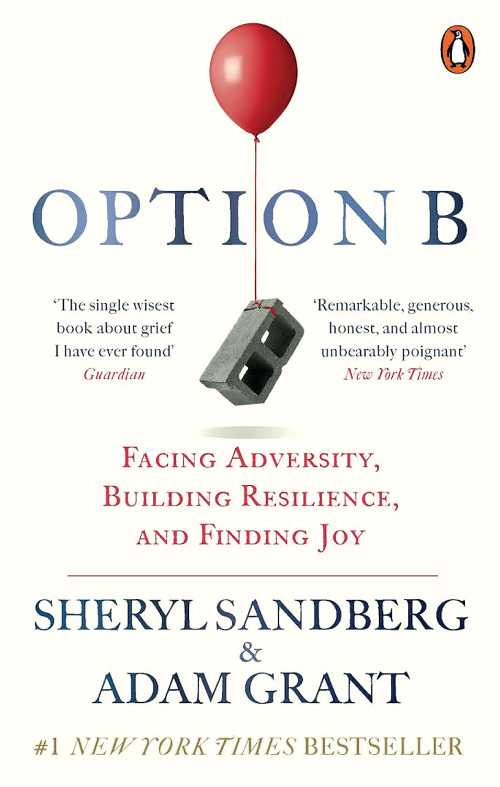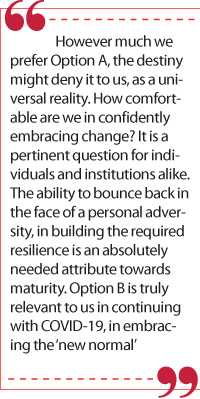Saturday Feb 07, 2026
Saturday Feb 07, 2026
Monday, 14 December 2020 00:10 - - {{hitsCtrl.values.hits}}
 I enjoyed reading a rare revelation of resilience, jointly written by a globally renowned business leader and a globally acclaimed veteran academic. No wonder that it is another New York Times best seller, which has high relevance to the pandemic times that we are passing through. Today’s column is a reflection of ‘Option B’, the mind-opening treatise.
I enjoyed reading a rare revelation of resilience, jointly written by a globally renowned business leader and a globally acclaimed veteran academic. No wonder that it is another New York Times best seller, which has high relevance to the pandemic times that we are passing through. Today’s column is a reflection of ‘Option B’, the mind-opening treatise.
Overview
Sheryl Sandberg is the Chief Operating Officer at Facebook. Prof. Adam Grant is a psychologist at Warton Business School, with best-selling author fame. Their combination has resulted in an authentic sharing of an individual transformation which has high impact on interpersonal and institutional levels as well.
After the sudden death of her husband, Sheryl felt certain that she and her children would never feel pure joy again. Her friend Adam had told her that there are concrete steps people can take to recover and rebound. I personally found this very enriching and encouraging, having lost four loved ones near and dear within a span of just four years. They are my precious son, my mother-in-love (more than “in-law”), loving mother and caring father (who left us only last week). I can empathise with people who grieve the departure of their relatives and friends due to COVID-19 all over the world. It is amazing how you could bounce back in being brilliant on basics. 
“Life is never perfect. We all live some form of Option B”, says Sheryl. In fact, Option B combines Sheryl’s personal ponderings with Adam’s revealing research on finding strength in the face of adversity. It explores the stories of a broad range of people who have overcome challenges in their lives, identifies how we can best talk to and help others in crisis, and offers practical tips for creating resilient families, communities, and workplaces.
Essence of Option B
The central experience directly relates to the sudden demise of David Bruce Goldberg. Two weeks after losing her husband, Sheryl was preparing for a family activity. “I want Dave,” she had cried. A friend had caringly told her, “Option A is not available. So, let’s just kick the shit out of Option B.”
In fact, it is all about building one’s resilience. It is like a muscle one can build. The challenge is knowing how. The book goes beyond Sheryl’s loss to explore how a broad range of people have overcome hardships including illness, job loss, sexual assault, natural disasters, and the violence of war. The book beautifully brings out the capacity of human spirit to persevere to rediscover joy. “Not everything that happens to us happens because of us,” observes Sheryl.
As the book tells us, resilience comes from deep within us and from support outside us. Even after the most devastating events, it is possible to grow by finding deeper meaning and gaining greater appreciation in our lives. Option B illuminates how to help others in crisis, develop compassion for ourselves, raise strong children, and create resilient families, communities, and workplaces. Many of these lessons can be applied to everyday struggles, allowing us to brave whatever lies ahead. In the absence of Option A, which is the ideal state, one needs to adapt and adjust to Option B, which is embracing perhaps the bitter reality.
Capability of ‘Copability’
“I have terrible news,” Sheryl told her children, after flying home from Mexico. “Daddy died.” The intimacy of detail that fills the book is unsettling, observes Caitlin Flanagan, writing to New York Times. As she further observes, “The candor and simplicity with which she shares all of it, including her children’s falling to the ground, unable to walk to the grave when they arrive at the cemetery, is a kind of gift.” Of course, Sheryl was shielded from the financial disaster that often accompanies sudden widowhood, but in every other way she was unprotected from great pain. Caitlin further reflects on Option B: 
“Life is cruel. It will casually take away the people we love the most. Even the vaunted ‘C-suite’ job is cold comfort when it cost you hours with a lost loved one. Now, two years after Goldberg’s death, Sandberg has written a book, ‘Option B’, which forthrightly addresses all of these issues. It is a remarkable achievement: generous, honest, almost unbearably poignant. She has little to gain by sharing, in excruciating detail, the events of her life over the past few years. This is a book that will be quietly passed from hand to hand, and it will surely offer great comfort to its intended readers.”
“Each one of us is more than the worst thing we’ve ever done,” observed Sheryl. As she did in the memorable Facebook post composed a month after the death, she reports turning in her misery to the psychologist Adam Grant, a friend who had flown to California to attend the funeral and is an expert in the field of human resilience. She told him that her greatest fear was that her children would never be happy again. He “walked me through the data,” she writes, and what she learns offers comfort. Getting ‘walked through the data’, is as modern a response to grief as the notion that ‘resilience’ is ‘some kind of science’.
The book includes several illustrative stories that seem to come from Grant’s research, but they are not memorable. It is Sandberg whose story commands our riveted attention, and it is her natural and untutored responses to the horror that are most moving. “This is the second worst moment of our lives,” she tells her sobbing children at the cemetery. “We lived through the first and we will live through this. It can only get better from here.” That is grief: Somehow, you find a language; somehow you get through it. No research could have helped her in that moment. She is the one who knew what to do and what to say. They were her children, and she knew how to comfort them.
“We plant the seeds of resilience in the ways we process negative events. After spending decades studying how people deal with setbacks, psychologist Martin Seligman found that three P’s can stunt recovery: (1) personalisation—the belief that we are at fault; (2) pervasiveness—the belief that an event will affect all areas of our life; and (3) permanence—the belief that the aftershocks of the event will last forever. The three P’s play like the flip side of the pop song ‘Everything Is Awesome’— ‘everything is awful’. The loop in your head repeats, “It’s my fault this is awful. My whole life is awful. And it’s always going to be awful.” Hundreds”
The way Adam has meaningfully combined the work of Martin Seligman with Sheryl’s life experience is amazing. Confidently overcoming the bitterness of personalisation, pervasiveness and permanence are very much relevant to us, as a nation experiencing 30 years of bloody war, two disastrous insurrections, ravaging Tsunami, multiple natural disasters and now of course the COVID-19. How many widows still grieve having lost their beloved children, both in the north and in the south? How many still find it difficult to forget how their near and dear got drowned in the Tsunami tide? How many must be finding it unbearable to experience their close ones who died due to COVID-19 are being cremated within 24 hours as per the health regulations? The key word is resilience.
“As we get older, we define happiness less in terms of excitement and more in terms of peacefulness,” says Sheryl. She quotes Reverend Veronica Goines who summed this up as, “Peace is joy at rest, and joy is peace on its feet.” It is an invitation to shift from grief to gratitude. As she further observes, “Sometimes we have less control than we think; other times we have more. I learned that when life pulls you under, you can kick against the bottom, break the surface, and breathe again.”
As the book illustrates, ‘post-traumatic growth’ could take five different forms: finding personal strength, gaining appreciation, forming deeper relationships, discovering more meaning in life, and seeing new possibilities.” I personally experienced the applicability of the above five, in the aftermath of the sudden demise of my beloved son, at the tender age of 13. It was resonating in the most recent event of losing my father. I have come across many remarkable men and women who have decided not to forget their lost loved ones but to move forward with their pleasant and positive memories. This is the application of option B, when option A becomes not available at all.
Way forward
“The oak fought the wind and was broken, the willow bent when it must and survived”, so said Robert Jordan. However much we prefer Option A, the destiny might deny it to us, as a universal reality. How comfortable are we in confidently embracing change? It is a pertinent question for individuals and institutions alike. The ability to bounce back in the face of a personal adversity, in building the required resilience is an absolutely needed attribute towards maturity. Option B is truly relevant to us in continuing with COVID-19, in embracing the ‘new normal’.
(Prof. Ajantha S. Dharmasiri can be reached through [email protected], [email protected] or www.ajanthadharmasiri.info.)